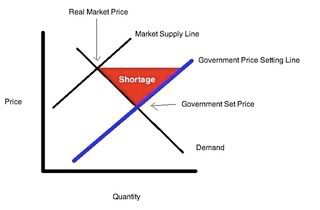Everyone in this country deserves the opportunity for healthcare. No, and I mean no one, should be denied coverage. This, as I've said, is one of the things I think the current healthcare legislation has right. People with preexisting conditions should be able to get care, they should know however that they're going to be paying more. Smokers should be able to get healthcare insurance, but they should pay out the ass for it because they make the conscious decision to endanger their health many times a day.
Regardless of whether you think that healthcare is a right or not, let's try to look at the issue from an economic point of view. Even before we do that, we have to come to some realizations. Whether you like it or not, the United States of America was founded on free-market principles. We have a lot more regulation nowadays, but our economy is essentially a free-market, where supply and demand sets pricing. Even if you think that capitalism is the bane of humanity, it's here to stay. At least in this country. And so long as we have a capitalistic society, we can't be instituting things that will affect a large portion of the economy negatively. Healthcare is estimated to make up 16% (Washington Post), and instating a healthcare system which negatively affects the economic efficiency of said system will hurt the economy. There's no way around it.
Back to the question at hand.
Whether you believe it's a right or not, let's just consider it what it is; a good.
When you go to buy homeowner's insurance, you're purchasing a good. It's the same when you buy car insurance. You're buying a good.
"But those don't pertain to the wellness of people" you say. Some could argue that they do, but I won't. Let's dig deeper.
Health insurance is only one type of insurance used to hedge against emergencies or tragedies. What about life insurance? Life insurance is used to make sure that those who depend on someone else to make the living have fiscal security after their loved ones have died. Should this be considered a right? What about long-term care insurance. This is becoming increasingly more important as the baby boomers start to retire. LTC insurance is something bought by the insured to make sure that when the inevitable time arrives in which they are put in a care facility they won't be a drain on their family's wealth. Should this be considered a right?
We can extend this argument to dental insurance and optical insurance. Are these rights? They are certainly good things, and they should be made available to anyone, but they're not a right.
So what's a government to do? If health insurance is not a right, then what can it do to lower costs? First we have to address the first problem in this dilemma, which is the government is trying to do something (PLEASE GOD STOP THEM!). Their hearts may be in the right place, but their brains aren't.
Some people argue that the government should set prices. Hmm...
Let us explore when our government has tried to set prices in the past.
After imports of oil fell sharply in the 1970s, the government tried to "help" the citizens of the U.S. by doing two things, one good and one bad:
- They reduced regulation on domestic oil companies, allowing them to pump more oil into the market. (The Good)
- They started to fix prices of gasoline to keep the prices artificially below what the market would have set them at. (The Horrifically Bad)
Here's what the pricing structure looks like when the market is allowed to set prices:
Demand and Supply meet and the price is set. Let's see what happens when the government attempts to set prices lower than the market dictates:
When the government sets the price of a good it creates a shortage. When a good is in shortage, it must be rationed.
So, if the government considers healthcare a right it will start to set prices. In this case the price setting is taking the form of a heavily subsidized "public option" that still might get through both houses. As I said in my previous post, this public option business is just one more thing that will complicate the market and increase prices for free market alternatives. This will push more people into the public option and eventually drive private health insurance out of the business except for the very rich. The public option is just a stepping stone on the way to a single-payer health system for the progressives.
So after all private options are gone the government will be the only purveyor of healthcare. They'll be pressured to keep prices artificially low, which will create a shortage. The shortage (caused by everyone wanting healthcare and doctors leaving the profession because it doesn't pay as well as it used to) will create the need for rationing.
So next time a progressive, liberal, or Democrat tells you that healthcare is a right, and that government run healthcare won't result in rationing, explain to them in a nice and respectful manner why they're completely wrong and need to take a few courses on basic economics.
I did a little sleuthing of Canada's two main progressive parties, and even they admit that their healthcare system makes necessary the act of having to wait for care, both basic and specialized.
Kind of funny how the media in America keeps telling us that Canada's health system doesn't mean longer wait times for procedures.
Just like I said in my last post, if we stop looking at this issue from an emotional standpoint and start looking at it from an economic standpoint, it's starts to make more sense.



No comments:
Post a Comment